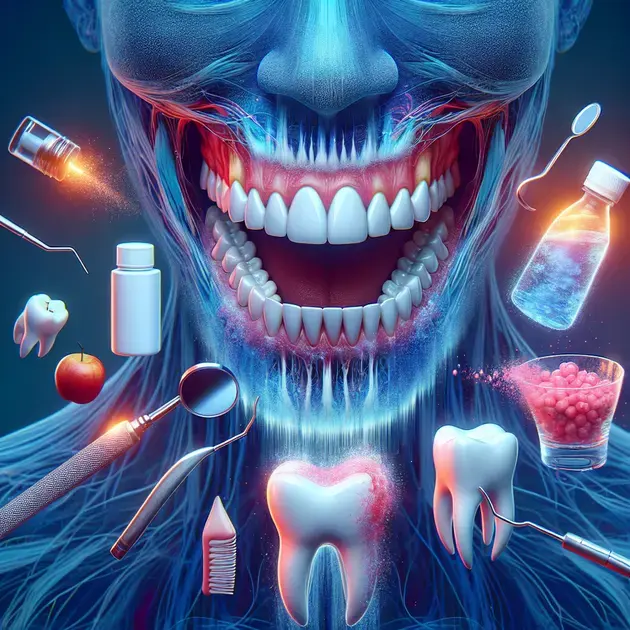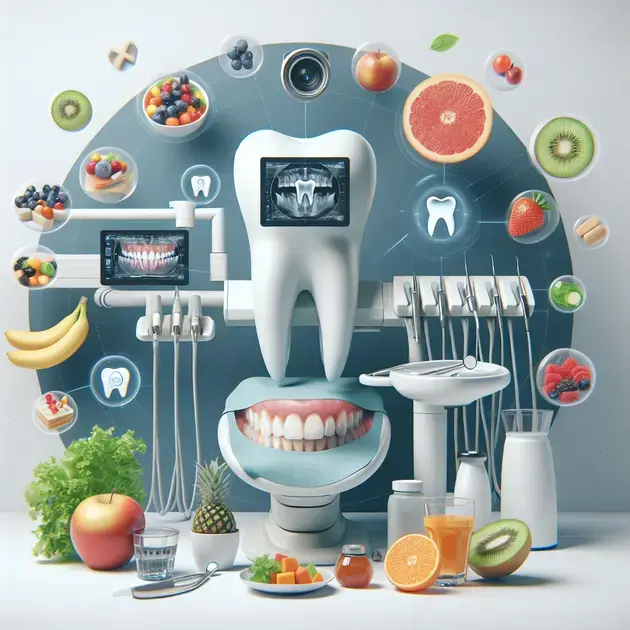When it comes to oral health, battling tooth decay on the side is crucial to maintaining a bright and healthy smile. With the rise of sugary snacks and acidic beverages in our daily diet, the prevalence of tooth decay has been steadily increasing over the years.
According to recent studies, untreated tooth decay can lead to severe consequences, such as cavities, gum disease, and even tooth loss. That’s why taking proactive steps to prevent and combat tooth decay is essential for overall dental well-being.

Preventing Tooth Decay: Key Strategies for Oral Health
To prevent tooth decay and ensure good oral health, it is essential to follow key strategies that can help maintain a healthy smile. One effective strategy is to brush your teeth at least twice a day with fluoride toothpaste. This helps remove plaque and bacteria that can lead to decay. Additionally, flossing daily is important to clean between the teeth and remove food particles that brushing alone may miss.
Another important strategy is to limit sugary and acidic foods and drinks in your diet. These can contribute to the erosion of tooth enamel and increase the risk of decay. Instead, opt for a balanced diet rich in fruits, vegetables, and dairy products that can help strengthen your teeth.
Regular dental check-ups and cleanings are also crucial for preventing tooth decay. Dentists can identify early signs of decay and provide treatments to prevent further damage. It is recommended to visit your dentist at least twice a year for routine check-ups.
Using fluoride mouthwash can also be beneficial in preventing tooth decay. Fluoride helps strengthen the enamel and make it more resistant to acid attacks. Incorporating this into your daily oral hygiene routine can provide added protection against decay.
Lastly, maintaining good oral hygiene habits, such as avoiding smoking and excessive alcohol consumption, can also play a significant role in preventing tooth decay and promoting overall oral health.
The Impact of Untreated Tooth Decay on Your Smile
Untreated tooth decay can have a devastating impact on your smile and overall oral health. If left untreated, decay can progress and lead to more serious issues such as toothaches, infections, and even tooth loss. The bacteria that cause decay can spread to other teeth and gums, increasing the risk of developing gum disease.
In addition to physical effects, untreated tooth decay can also have emotional and social consequences. The pain and discomfort associated with decay can affect your quality of life and confidence. Dental problems resulting from untreated decay can also impact your ability to chew and speak properly.
Furthermore, untreated decay can result in the need for more extensive and costly dental treatments in the future. This can include procedures such as root canals, crowns, and even tooth extractions. By addressing decay early on, you can avoid these more invasive treatments and maintain a healthy smile.
It is important to seek professional dental care if you suspect you have untreated tooth decay. Dentists can provide the necessary treatments to address the decay and restore the health and appearance of your smile. Early intervention is key to preventing further damage and preserving your oral health.
Remember, neglecting untreated tooth decay can have long-lasting consequences, so it is important to prioritize your dental health and seek treatment as soon as possible.
Effective Solutions for Battling Tooth Decay at Home
While professional dental care is essential for preventing and treating tooth decay, there are also effective solutions that you can implement at home to battle decay. One such solution is using a fluoride toothpaste approved by dental associations, such as the American Dental Association. Fluoride helps strengthen enamel and protect against decay.
In addition to brushing and flossing, using an antimicrobial mouthwash can help reduce the levels of bacteria in your mouth that contribute to decay. Look for mouthwashes that are specifically designed to combat plaque and gingivitis to maintain a healthy oral environment.
Another effective solution for battling tooth decay at home is to incorporate dental sealants into your oral hygiene routine. Sealants are thin protective coatings applied to the chewing surfaces of the back teeth to prevent decay in hard-to-reach areas. Consult with your dentist to determine if sealants are a suitable option for you.
Furthermore, consuming foods and beverages rich in calcium and vitamin D can promote healthy teeth and gums. These nutrients help strengthen enamel and support overall oral health. Consider incorporating dairy products, leafy greens, and fortified foods into your diet to maintain strong teeth.
Lastly, staying hydrated by drinking plenty of water throughout the day can help rinse away food particles and bacteria that can contribute to decay. Water also helps stimulate saliva production, which plays a crucial role in neutralizing acids in the mouth and protecting against decay.

Understanding the Importance of Dental Check-ups for Oral Health
Regular dental check-ups are crucial for maintaining good oral health. These routine visits to the dentist play a significant role in preventing dental issues such as cavities, gum disease, and oral cancer. During a dental check-up, your dentist will thoroughly examine your teeth and gums, looking for any signs of decay or disease. Early detection of these problems can help prevent them from worsening and requiring more invasive treatment in the future.
In addition to detecting and preventing dental issues, regular check-ups also involve professional cleaning of your teeth. Even with diligent at-home oral hygiene, plaque and tartar can build up over time, leading to tooth decay and gum inflammation. Professional cleanings can remove these deposits, keeping your teeth and gums healthy and reducing the risk of developing oral health problems.
Furthermore, dental check-ups provide an opportunity for your dentist to educate you on proper oral care techniques. They can offer personalized advice on brushing and flossing techniques, as well as recommend specific oral care products suited to your needs. By following their guidance, you can improve your at-home oral hygiene routine and maintain optimal oral health between visits.
Overall, scheduling regular dental check-ups is essential for preserving your oral health and preventing potential dental issues. By prioritizing these appointments, you can ensure early detection of problems, receive professional cleanings, and benefit from expert guidance on oral care practices.
How Diet and Nutrition Affect Dental Health
The link between diet, nutrition, and dental health is undeniable. The foods and beverages we consume have a direct impact on the health of our teeth and gums. A diet high in sugary and acidic foods can contribute to the development of cavities and erosion of tooth enamel. On the other hand, a diet rich in nutrients like calcium, vitamin C, and fiber can promote strong teeth and healthy gums.
Sugar, in particular, is a major culprit in poor dental health. Bacteria in the mouth feed on sugars from food and drinks, producing acids that attack tooth enamel and lead to decay. Limiting sugary snacks and beverages can help reduce the risk of cavities and maintain good oral health. Instead, opt for fresh fruits and vegetables, dairy products, and lean proteins to support healthy teeth and gums.
In addition to watching sugar intake, staying hydrated is also essential for dental health. Water helps wash away food particles and neutralize acids in the mouth, reducing the risk of decay and gum disease. Drinking water regularly throughout the day can help keep your mouth clean and your teeth strong.
Overall, adopting a balanced diet rich in essential nutrients and low in sugar can significantly impact your dental health. By making mindful food choices and staying hydrated, you can support strong teeth, healthy gums, and overall oral well-being.
The Role of Fluoride in Preventing Tooth Decay
Fluoride plays a crucial role in preventing tooth decay and maintaining good oral health. This natural mineral helps strengthen tooth enamel, making it more resistant to acid attacks from bacteria and sugars in the mouth. Fluoride can also reverse early signs of tooth decay, such as white spots on the teeth, by remineralizing the enamel and preventing further damage.
One of the most common ways to benefit from fluoride is through fluoridated water and dental products. Many communities add fluoride to their water supply to help prevent cavities in residents. Additionally, fluoride toothpaste and mouth rinses are widely available to use at home as part of your oral hygiene routine.
Professional fluoride treatments are another option for ensuring adequate protection against tooth decay. During a dental visit, your dentist may apply a fluoride varnish or gel to your teeth, providing an extra layer of defense against acids and bacteria. These treatments are especially beneficial for individuals at high risk of cavities or those with weakened enamel.
Overall, fluoride is a valuable tool in the fight against tooth decay and should be incorporated into your daily oral care regimen. By using fluoridated products, drinking fluoridated water, and receiving professional treatments when necessary, you can strengthen your teeth and reduce the likelihood of developing cavities.
Conclusion
In conclusion, regular dental check-ups are essential for maintaining optimal oral health. These visits not only help prevent dental issues like cavities, gum disease, and oral cancer but also enable early detection and intervention, avoiding the need for more invasive treatments in the future. The professional cleaning provided during check-ups removes plaque and tartar buildup, safeguarding against tooth decay and gum inflammation.
Moreover, the impact of diet and nutrition on dental health cannot be overstated. A diet rich in nutrients like calcium, vitamin C, and fiber promotes strong teeth and healthy gums, while reducing sugar intake minimizes the risk of cavities and decay. Staying hydrated by drinking water regularly aids in washing away food particles and maintaining a clean, acid-neutral environment in the mouth, thus supporting overall oral well-being.
Additionally, the role of fluoride in preventing tooth decay is crucial. Incorporating fluoride through water, dental products, and professional treatments helps strengthen tooth enamel, making it more resilient against acid attacks. By embracing these preventive measures and following expert guidance on oral care practices, individuals can effectively combat tooth decay, enhance their oral health, and reduce the likelihood of developing cavities. Prioritizing regular check-ups, a balanced diet, and fluoride usage are key steps towards achieving and maintaining a healthy smile!